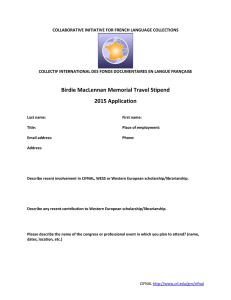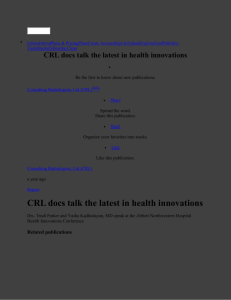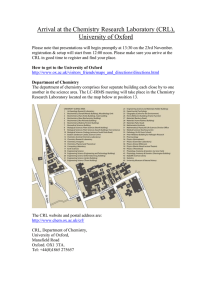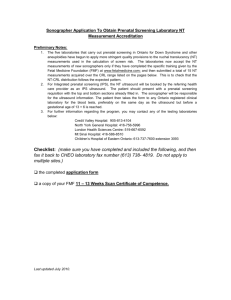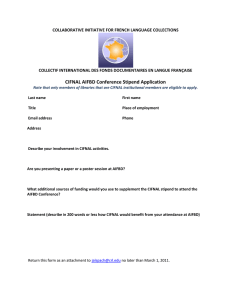Alternative CRL provision
advertisement
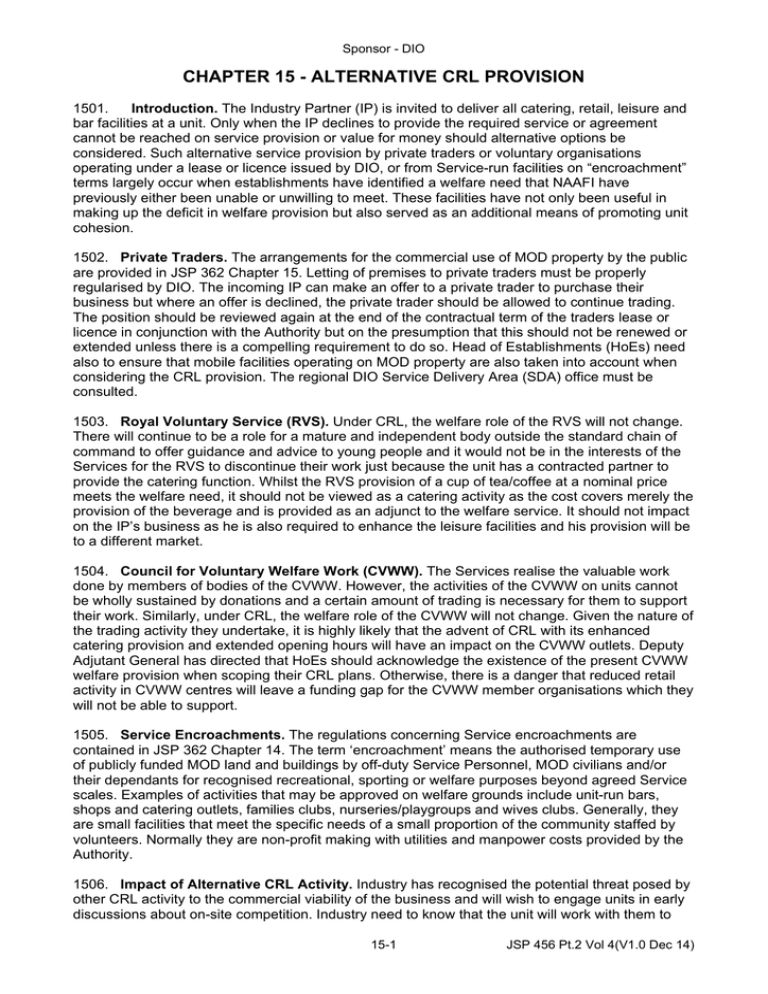
Sponsor - DIO CHAPTER 15 - ALTERNATIVE CRL PROVISION 1501. Introduction. The Industry Partner (IP) is invited to deliver all catering, retail, leisure and bar facilities at a unit. Only when the IP declines to provide the required service or agreement cannot be reached on service provision or value for money should alternative options be considered. Such alternative service provision by private traders or voluntary organisations operating under a lease or licence issued by DIO, or from Service-run facilities on “encroachment” terms largely occur when establishments have identified a welfare need that NAAFI have previously either been unable or unwilling to meet. These facilities have not only been useful in making up the deficit in welfare provision but also served as an additional means of promoting unit cohesion. 1502. Private Traders. The arrangements for the commercial use of MOD property by the public are provided in JSP 362 Chapter 15. Letting of premises to private traders must be properly regularised by DIO. The incoming IP can make an offer to a private trader to purchase their business but where an offer is declined, the private trader should be allowed to continue trading. The position should be reviewed again at the end of the contractual term of the traders lease or licence in conjunction with the Authority but on the presumption that this should not be renewed or extended unless there is a compelling requirement to do so. Head of Establishments (HoEs) need also to ensure that mobile facilities operating on MOD property are also taken into account when considering the CRL provision. The regional DIO Service Delivery Area (SDA) office must be consulted. 1503. Royal Voluntary Service (RVS). Under CRL, the welfare role of the RVS will not change. There will continue to be a role for a mature and independent body outside the standard chain of command to offer guidance and advice to young people and it would not be in the interests of the Services for the RVS to discontinue their work just because the unit has a contracted partner to provide the catering function. Whilst the RVS provision of a cup of tea/coffee at a nominal price meets the welfare need, it should not be viewed as a catering activity as the cost covers merely the provision of the beverage and is provided as an adjunct to the welfare service. It should not impact on the IP’s business as he is also required to enhance the leisure facilities and his provision will be to a different market. 1504. Council for Voluntary Welfare Work (CVWW). The Services realise the valuable work done by members of bodies of the CVWW. However, the activities of the CVWW on units cannot be wholly sustained by donations and a certain amount of trading is necessary for them to support their work. Similarly, under CRL, the welfare role of the CVWW will not change. Given the nature of the trading activity they undertake, it is highly likely that the advent of CRL with its enhanced catering provision and extended opening hours will have an impact on the CVWW outlets. Deputy Adjutant General has directed that HoEs should acknowledge the existence of the present CVWW welfare provision when scoping their CRL plans. Otherwise, there is a danger that reduced retail activity in CVWW centres will leave a funding gap for the CVWW member organisations which they will not be able to support. 1505. Service Encroachments. The regulations concerning Service encroachments are contained in JSP 362 Chapter 14. The term ‘encroachment’ means the authorised temporary use of publicly funded MOD land and buildings by off-duty Service Personnel, MOD civilians and/or their dependants for recognised recreational, sporting or welfare purposes beyond agreed Service scales. Examples of activities that may be approved on welfare grounds include unit-run bars, shops and catering outlets, families clubs, nurseries/playgroups and wives clubs. Generally, they are small facilities that meet the specific needs of a small proportion of the community staffed by volunteers. Normally they are non-profit making with utilities and manpower costs provided by the Authority. 1506. Impact of Alternative CRL Activity. Industry has recognised the potential threat posed by other CRL activity to the commercial viability of the business and will wish to engage units in early discussions about on-site competition. Industry need to know that the unit will work with them to 15-1 JSP 456 Pt.2 Vol 4(V1.0 Dec 14) Sponsor - DIO ensure that alternative CRL encroachments are kept to a minimum, and those jointly agreed to continue between the HoE or his representative, the DIO IM and the IP, and that stock is purchased in the first instance from the IP unless a cheaper supplier can be found. Invariably the amount of investment capital on offer will be influenced by the number/type of activities and the unit’s position on their retention. It is important for HoEs to view the totality of the benefits package rather than overly focus upon immediate cash generation. For example, the most significant benefit will undoubtedly be the substantial inward investment made by IPs to modernise and improve facilities. There is also the possibility of building up a good partnering relationship with the IP that could result in local agreements to sponsor unit events or to directly fund particular purchases. The answer lies not in taking up entrenched positions in order to preserve the status quo, but in allowing IPs to deliver the maximum range of services across the unit, subject to an acceptable agreement being reached on the transfer of any non-publicly funded assets whilst also recognising the value of unit morale and cohesion provided by other CRL activities. This will ensure that the best possible use is made of available resources. 1507. Impact of Legislation on Alternative CRL Provision. In addition to the likely negative impact that alternative activities may have on the commercial viability of CRL, due account needs to be taken of changes in legislation and the impact this could have on non-public business. The Charities Act set out the conditions under which institutions may apply to the Charities Commission for recognition of their charitable status. Service Non-Public Funds (SNPFs) are required to comply with the Charities Act, but provided they meet certain simple criteria, they are generally “exempt” from the requirements for registration and submission of annual accounts. However, provisions in the Charities Act 2006 has to some extent changed this position and with effect from 01 Oct 08 those SNPFs with an annual income exceeding £100,000 will now be required to register with the Commission which will require the formal appointment of trustees and each fund to submit their accounts after independent civilian audit to the commission annually. It is not known how many activities may be exempt because of their low business turnover but this requirement could create an increased workload for station and unit personnel. 1508. Service Personnel often take on additional duties in support of unit non-public funded welfare objectives. Where these are reflected in the individual’s job description/Terms of Reference and while they are engaged in such activities, 2007DIN02-193 now confirms such individuals are considered to be acting in the course of their official duty with MOD and that corresponding liability for their actions lies with the Department. It is therefore essential HoEs ensure that appropriate insurance cover for such activities is in place. Specifically, where publicly funded MOD property is authorised to be used in pursuance of non-publicly funded activities then the use must be covered, as appropriate, by a lease, licence, or encroachment agreement and be fully insured by the nonpublic operator. In addition, appropriate insurance cover should be in place that will protect the Department against any claims for unfair dismissal of those personnel employed directly by the non-public operator. 1509. Additional CRL Services. Where MOD provides accommodation of any sort for use by the IP, private traders, voluntary organisations or for Service-run activities on encroachment terms it is important to avoid the creation of a protected business tenancy under the Landlord & Tenant Acts which would entitle the occupier to claim security of tenure and remain in possession of the accommodation after the use is ended. When considering additional CRL services as a part of or alongside CRL business the following is provided as a broad guide to the requirements for putting in place additional services: 1510. Additional CRL Services In with the Core CRL Business Stream. a. Business Case (BC) to be prepared jointly by the local unit and partnering team. b. BC to be approved by the appropriate DIO personnel including, Soft FM Finance and Soft FM Commercial staff. 15-2 JSP 456 Pt.2 Vol 4(V1.0 Dec 14) Sponsor - DIO c. Arrange variation to the MAC to include additional CRL service provision, through DIO Infrastructure Manager (IM). d. Arrange corresponding variation of the Lease through DIO SDA to include any additional estate facilities to be produced. e. Income to the unit to be via the gainshare arrangements built into the Contract. 1511. Additional CRL Services (Private Traders, Voluntary Organisations) Out with the Core CRL Business Stream. a. BC to be prepared jointly by the local unit and partnering team. b. BC to be approved by DIO personnel including, Soft FM Finance and Soft FM Commercial staff. c. DIO to arrange the tender action, the grant of the lease (contracted out of the Landlord & Tenant 1954) or licence (as appropriate) and the collection of the rent. Note: Term of lease/licence granted to be timed to expire concurrent with the expiry date of current MAC to avoid continuance of trading on site post award of a new contract. d. Rent collected to be attributed to DIO budget area. 1512. Additional CRL Services (Service-run encroachments) Outwith the Core CRL Business Stream a. Activity to be considered jointly and approved by the HoE of local unit and the Partnering Team. b. Details of activity approved to be entered in the unit encroachment register and covered by a formal agreement between a local Siting Board convened of all appropriate stakeholders chaired by the DIO SIM and the encroachment holder stating each party’s responsibilities; the maintenance and other support the unit will provide; any charges to be made; and termination arrangements. c. The DIO SIM is to be consulted in drawing up the agreement. 1513 – 1599. Reserved. 15-3 JSP 456 Pt.2 Vol 4(V1.0 Dec 14)
